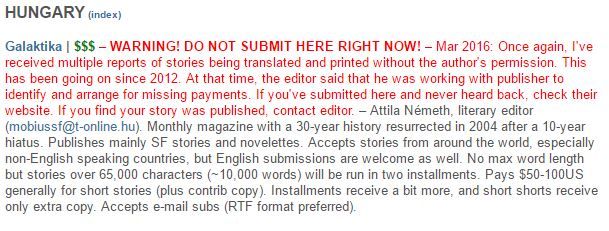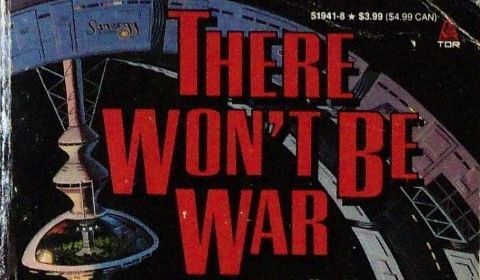Elemző: nem a Fidesz legfőbb érdeke, hogy nyilvánosságra kerüljön Magyar Péter legsötétebb titka

Az sem maradt sokáig rejtély, miért „ijedhettek meg egy ágy képétől” a baloldalon.

We began our research based on an online caution for foreign writers and ended it with the discovery of a series of stolen works. We found that Hungarian SF magazine Galaktika regularly published articles from foreign writers without permission. The editor-in-chief states royalties are complicated issues in the world and that even Michael Jackson’s agent is unfamiliar with which radio stations play his music, and how many times it is played.
The cover of the Galaktika magazine for March caused turmoil at Moly (a Hungarian online book database) at the beginning of March. It was not the first time that the cover was Star Wars themed, which was reasonable until December; however, when four months later Darth Vader once again appeared on the cover in a pink gown, blowing his nose, it became simply ridiculous. The biggest issue with the 312th issue of Galaktika was unfortunately not the cover, but rather that the magazine had published a number of works without a permit. It would later be discovered that this was not a one-time incident, but that most of the short stories that were published last year had also been released without the consent of the authors, meaning that Galaktika is guilty of stealing the rights to these pieces.
However, before continuing this article, a brief introduction to the magazine is required. Galaktika magazine has been publishing SF stories since its creation in 1972 by Peter Kuczka, who continued to manage the magazine until 1995. For the most part, the writings of Hungarian authors of the genre were published int he magazine where translations of foreign works could also be enjoyed. Under the communist regime, Galaktika was a cornerstone of the genre; however – like many other things – shortly after the democratization of the country, the magazine flopped. It was reintroduced in 2004, and alongside its reintroduction, the Galaktika Fantasztikus Könyvek (Galaktika Fantastic Books) series was also brought back to life in 2005. The current chief editor is Istvan Burger, and the literary editor is Attila Nemeth.

The interview with them was concluded and will be available to read soon; the letter of response to this article from Istvan Burger is available at the end of this piece. However, while I was preparing for the interview, my eye caught the following.
˝Warning! Do not submit here right now!˝
Something seemed odd about this magazine. Before the interview with the heads of Galaktika, I began researching the magazine, which is when I discovered the Foreign Market List by Doug Smith; he listed a number of foreign publication opportunities for SF authors and labelled the papers in each country according to how they handle submitted pieces. This is where the following warning was discovered: ˝Once again, I've received multiple reports of stories being translated and printed without the author's permission. This has been going on since 2012.˝ Upon reading this, I contacted Smith, who then put me in contact with those authors affected.

One of these short stories was the piece called Documentary by Vajra Chandrasekra published in Galaktika magazine in March and which can be read for free on the website of Lightspeed. Chandrasekra told me that he had no idea about this recent publication; he had given no consent to it, and had not yet received a royalty for it. He was tipped-off by Thomas M. Waldroon, whose short story Sinseerly A Friend & Yr. Obed't was also published in the March edition of Galaktika. Chandrasekra also mentioned that it is not unusual that works are published without royalties payed, but that this is more common in fanzines, but even fanzines publish only after consent from the author. After the correspondence, we were contacted by Thomas M. Waldroon, who stated: ˝I’m in the habit of googling my own name, about once a month or so, just to see what there is to see. This time, all these Hungarian sites popped up. I can’t read Magyar, but I clicked on one link, and there was Darth Vader, dressed in pink, on what looked like a magazine cover — and the cover had my name on it!˝ He had no idea that his short story would be published in the magazine; he received no contributor's copy, and no royalty. Waldroon’s piece is also available free on the Internet.
It’s important to mention that just because a piece is available free on the internet, does not make it free to plunder. The same requirements still apply as if it were not available for free anywhere; this means that the right to publish and the royalties need to be discussed with the author, the publisher, or the publishing magazine that bought the rights. According to the emails, failed to do this on both occasions. The result was that Galaktika published the intellectual property of two writers without consent. (More on copywright law at the end of the article).
Waldroon summarizes his emotions concerning the issue in the following way: ˝One, because it’s theft, plain and simple. Piracy. Two, because I could have helped the translator. This story is full of bits of American history that are very obscure even to most Americans. To Hungarians, the story must be baffling without a little explanation. Three, because I have an old-fashioned notion that I ought to get to decide for myself where my stories appear. And four, because they are unfairly profiting off the work of others, and have been for years. It’s the arrogance of their sense of impunity that really angers me.˝
Of course, one could say that there is no need to get angry over two instances. But the question is whether it is really only this many.
This is not a mistake, but a practice
After the complaints from the two authors, we researched the other articles in the March edition. One of the pieces was part of the retro column, which prints one of the articles previously published by Galaktika again; the other three pieces belong to Hungarian writers. We assume that they were informed about the publications accordingly – one of whose books is currently being published at Galaktika. Like the pieces from Chandrasekra and Waldroon, Collegiate Casting-Out of Devilish Devices by Terry Pratchett and When Sysadmins Ruled the Earth by Cory Doctorow can both be accessed for free on the Internet. We contacted Doctorow and the literary agent of the recently deceased Pratchett: they had no idea about the publication. The Creative Commons License allows Doctorow’s pieces to be accessed, but this does not mean that one can freely publish the piece and demand a fee for its enjoyment.

Therefore, after sifting through the March edition of Galaktika, we have reached the astounding conclusion, that of the five authors published in the magazine, not a single one was informed of the publication; they had not consented, nor were they given royalty in exchange. These are pieces that are protected under copyright law, but nevertheless free to access on the Internet; this means that there is big money to be made if one has the desire to start a successful, but cheap magazine. There is no stopping here: so I began – at first, randomly and later in an orderly fashion – to check each and every story from last year’s Galaktika.
A Year of Piracy
In January, 2015 the 298th edition of Galaktika was published, but – apart from the retro short story (in the future, we won’t count this separately) – only foreign authors were present, altogether six. Three out of these six can be accessed for free on the internet. Two out of the remaining three can be found in two anthologies. The first is called There Won’t Be War, edited by Harry Harrison and Bruce McAllister, which was released in the 1991 edition of Tor; the second is Years’ Best SF 14, which was released by Eos publishing in 2009 and was edited by David G. Hartwell and Kathryn Cramer.
We contacted Bruce McAllister in connection with the copyrights to There Won’t Be War anthology, and he informed us that the rights to the 1991 edition have returned to the authors, and that if someone wanted to publish from this, they would have to contact the authors one by one; however he doubt Galaktika did that. We attempted to contact a number of authors, but only the veteran sci-fi author Timothy Zahn answered, stating that he knows nothing about the publication. According to the editors and agents, the rights to Year’s Best SF 14 (YBSF) do not belong to Galaktika or to Metropolis Media – the publishing firm of Galaktika’ books – and they also stated that the pieces can only be released in one edition, as a whole, and not each as a single entity. We attempted to contact each of the authors to see whether they sold the rights one by one, although this in itself would seem strange.
In the February edition, alongside the usual three online available stories, we also find two pieces: one from each of the previously mentioned anthologies; in addition to these the story Flappy Bird by John Scalzi. This final work was originally featured in Popular Science under the article Dispatches from the future, which introduced ten contemporary and popular authors' mini short-stories from the near-future. In the following months, more pieces from this collection appear in Galaktika, while placing the names of the popular writers like Scalzi, Ann Leckie, or Ian Tregillis on the cover. I was the one who had informed Popular Science of the Hungarian translations of this collection; they had given no consent whatsoever.

We skipped the March edition (2015) because the magazine was celebrating its 300th edition by publishing writings from respected Hungarian authors. In April, however, the regular repertoire continues: three free short stories from the internet, one piece from the anthology; a Pratchett story, for which the agent had given no consent – and then two more works from the Popular Science collection. One of the works found online belongs to Kim Stanley Robinson, whose name is particularly eye-catching. Our research into the May edition resulted in two free short stories and one from the YSBF. The May XL-edition of Galaktika contained a translation of Robert Bloch’s The Shambler from the Stars, which was published without the translator's consent. The translation of the story was available for free on a blog.
In June, the magazine published two stories from There Won’t Be War; one from Tor.com; and Ten with a Flag by Joseph Paul Haines, a publication that the author – once again – was unaware of. Lee Battersby, author of In from the Snow was also unaware of the publication in this edition of the magazine. The July edition contained more works from Popular Science (from Ann Leckie and Ian Tregellis), and also a story by Tom Hanks originating from the New Yorker. We have not yet received a response from any of these sources. The August edition saw two more free, online stories and two stories from YBSF. The September edition also contained two stories from YBSF, and the two online stories, which can be found in the magazine were: a Pratchett story, and The Cat Who Walked a Thousand Miles by Kij Johnson, a story that was already published a year earlier in Galaktika and originally appeared at Tor.com.
And this would continue on: Galaktika magazine had, for the most part, published free stories available online; works from two anthologies that may or may not have been stolen; and works from the Popular Science piece. Alongside these, there were publications from Hungarian authors; pieces reused from earlier Galaktika magazines; or works for which I could not find the original source because there is no online source or because the original language was not English. For the most part these originate from before 1990, which does not mean they are bad quality, but rather they are not relevant in today’s world. Also, their authors are most probably deceased and are not googling themselves. Of course, this does not mean the magazine may not have bought the rights to these short stories.
This has been going on for a while
During our investigation we contacted multiple papers, publishers, literary agents, and authors. To be fair, there was an author who was informed about the Galaktika publications, that author was Jason Sanford. However, every other contact was oblivious to the publication and not only for last year, but from previous years as well. The author of the short story The Defenders, Colin P. Davis was not informed – nor given his due royalty – about a publication from 2006; in fact, after discovering this, he requested only a contributor's copy, however the editors did not even respond to his letter. Lily Yu, who submitted a work in 2011 was more fortunate, because after it was published in 2012 – without informing her – she received a contributor's copy and a promise of royalty, which would later only remain a promise.
Multiple works can be accessed for free on the Clarkesworld website. It’s worth noting that after we contacted them in an email, the editor’s response was: ˝They are at it again?˝ Neil Clarke stated that they had not been contacted, but that they had had issues with this magazine previously. We contacted the authors in the YBSF anthology: Elizabeth Bear and Sarah Monette, authors of Boojum were not informed of the publication, nor was Gwyneth Jones (Ann Halam), whose work Cheats was published in Galaktika.
In 2006, a short story was published by the author of the aforementioned list, Doug Smith; in 2008 he received his royalty from Galaktika. Vajra Chandasekra and Thomas M. Waldroon, authors of the short stories published in March, have already contacted the publisher with regards to royalties. Waldroon has not yet received an answer, while Chandasekra has been contacted to discuss the royalty. We have not yet been able to reach Tor with regards to their anthologies; furthermore, the New Yorker is yet to reply about the Tom Hanks story, as is Tom Hanks himself (although the actor only provided a mailing address on his website).
According to the experts, blatant copyright infringement has occurred
We contacted Péter Mezei with reference to this issue; he is an associate professor at the Faculty of Law in Szeged and is a member of the Council of Copyright Experts. Mezei stated that this issue clearly obstructs Act LXXVI 29§ of 1999 pertaining to copyright laws because the right to translation belongs to the author. The statute declares first and foremost that this is the author’s right. Hungary as a member of the most important of copyright law conventions, as well as a member of the European Union, is required to grant the same rights to foreign authors as those that are granted to Hungarian authors. This means that foreign short stories could only have been translated with consent from the foreign authors – writes Mezei. He added that despite these works being free and available online, this does not alter the rights in any way.
We asked the expert, what sort of steps can be taken in compensating the authors impaired. ˝The foreign author has the right to take action either in Hungary or abroad based on Hungarian law, specifically the Hungarian Civil Code or copyright laws. The most moderate penalty that can be given is a caution. However, this means little assistance for the authors, especially considering that their works have already been published illegally by Galaktika and are on the market. Therefore, the destruction of all illegal material is impossible and only those copies, which are still in storage can be destroyed. The authors can easily file for compensation for the use of their works to make a profit” – states Mezei.
This is not over yet
It would be a problem even if the illegal publishing of a work occurred in a single instance; however, it seems that it is a regular practice for the Galaktika magazine with a 1000 HUF price tag to publish stories found free online and translated without any sort of consent. Thomas M. Waldron has the following to say about the incident: ˝They believe that they’re too far away, that the language barrier is too hard to foreigners to deal with, that the sums involved are too small to justify litigation, that, in short, they can get away with it. They have been for years, after all˝.
This practice stops today. Mandiner.sci-fi cannot support such unethical and lawless practices and therefore from now on we will no longer notify our readers about the publication of newer volumes, not until this practice stops. Furthermore, we will investigate whether the short stories found in the magazine each coming month and contact the authors about whether they have been informed about the publication.
Galaktika editor-in-chief: The issue of royalties is a complicated issue
Istvan Burger, editor-inchief of Galaktika responded to our article in the following way: ˝Without delving deeper into the article, the only thing I can state, is that the issue of royalties in today’s world is a very complicated issue and that even Madonna or Michael Jackson’s agent is unfamiliar with which radio stations play their music, and how many times it is played. If they are fortunate, they get a transfer surmounting to the possible number of plays. This is no different in the literary world.˝
Update:
The editor of Strange Horizons, Kate Dollarhyde states – in a reaction to our contact – that they are unaware of Galaktika’s publications. She had contacted the authors; Malcom Cross stated that he did not sell the rights to the work called Pavlov’s House, while Kim Stanley Robinson did. Dollarhyde also stated that they have turned to the Science Fiction and Fantasy Writers of America with regards to the issue.
After reading our article, Anna Grace Carpenter checked volumes of Galaktika published before 2015, and contacted authors. Aliette DeBodard, the recently awarded author of the novel The House of Shattered Wings was also unaware of her short story, which appeared in Galaktika.
*
Below we provide a list of affected authors from 2014 an 2015. If you are an author wondering if your work was published in Galaktika without your consent, you sould also check your name in Galaktika's online bibliography.
Jerry Pournelle, Daryl Gregory, Chandler Davis, Philip José Farmer, George Zebrowski, Michael Swanwick, Lucius Shepard, Robert Sheckley, John Scalzi, Mary Rickert, Robert Reed, Tanya Huff, Fredric Brown, Scott Lynch, Malcolm Cross, Terry Pratchett, Polenth Blake, Karl Schroeder, Timothy Zahn, Patricia McKillip, Tanith Lee, Rudy Rucker, Terry Bisson, Marc Laidlaw, Lee Battersby, Frederik Pohl, Joseph Paul Haines, Vasili Golovachov, Wolfgang Jeschke, Ann Leckie, Tom Hanks, Ian Tregillis, Elizabeth Bear, Sarah Monette, Jack C. Haldeman II, Vandana Singh, Dmitry Kalinin, Eddy C. Bertin, Roman Kulikov, Alastair Reynolds, Sue Burke, Kij Johnson, Philip K. Dick, Domingo Santos, Gwyneth Jones (Ann Halam), Robert J. Sawyer, Henry Lion Oldie, Don DeLillo, Malcolm Edwards, Robert Bloch, John Crowley, Robert Charles Wilson, Cory Doctorow, Thomas M. Waldroon, Vajra Chandrasekera, Andy Duncan, Joe Haldeman, Jeff Vandermeer, Melinda Snodgrass, Ellen Kushner, Raymond Z. Gallun.